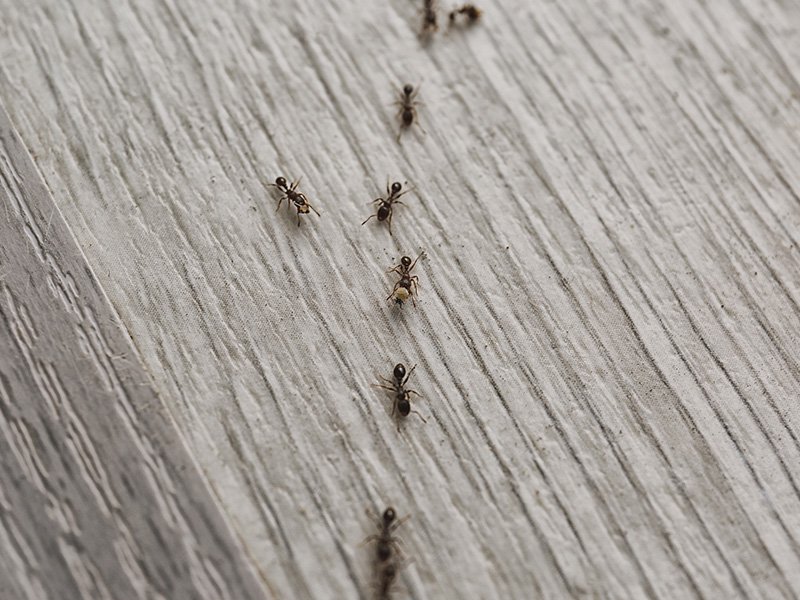Common Texas Ant Species and the Problems They Cause
The Woodlands and other Texas communities are home to dozens of ant species, and quite a few aren’t shy about moving into your home. Even so-called “nuisance ants” can contaminate food and become a persistent problem. And when it comes to more destructive or aggressive species, the risks go well beyond simple frustration.
Here are just a few of the common ant species you’re likely to encounter—and what they can do once inside your home:
Carpenter Ants
These large black or red ants are bad news for your home. While they don't sting or bite, they do chew through wood to build their nests. Over time, this can lead to serious structural damage, especially if the colony goes unnoticed. Reproductive carpenter ants even have wings and can often be seen flying around in spring and summer.
Crazy Ants
Crazy ants are small, reddish-brown ants known for their erratic, zigzag movements. While mostly a nuisance, they become a bigger issue when they nest indoors—especially near electrical equipment. They've been known to short out electronics and even cause small fires by interfering with wiring.
Fire Ants
Fire ants may be small, but they pack a punch. They typically build large mounds in sunny areas of your yard, but they sometimes make their way indoors. What makes them particularly problematic is their aggressive behavior. They swarm and sting when their nest is disturbed—even by simply walking nearby. If your kids or pets play outside, fire ants are more than just a minor inconvenience.
DIY Ant Prevention Tips for Texas Homeowners
Keeping ants out of your home takes a bit of effort, but many effective prevention methods are simple and part of routine home maintenance. Here’s how to make your home less appealing to ants:
Keep the Kitchen Clean
If there’s food out, ants will find it. To keep them from turning your kitchen into a buffet:
- Wipe down counters and clean up crumbs and spills immediately
- Don’t leave dirty dishes sitting in the sink
- Store food in airtight containers or refrigerate it
- Take out the trash regularly
- Vacuum or sweep floors often
- Clean out the pantry periodically to remove expired or open items
- Keep pet food sealed
Watch Out for Water and Moisture Issues
Ants need water to survive. To eliminate moisture sources and keep things dry:
- Fix leaks under sinks and around appliances
- Use a dehumidifier in damp areas like bathrooms or basements
- Repair dripping faucets (both indoors and outdoors)
- Replace water-damaged wood and building materials
Seal Potential Entry Points
Ants can squeeze through incredibly small openings. While you can’t block them all, sealing key trouble spots can help:
- Seal gaps around doors and windows
- Patch cracks in your foundation
- Repair holes in siding
- Close gaps around utility lines and plumbing
- Replace missing shingles and fix roofline openings
Don’t Forget the Yard
Ant problems often start outside, so maintaining your yard can make a big difference:
- Trim plants and shrubs near your foundation
- Ensure tree branches don’t touch your roof or siding
- Keep garbage bins sealed and at least 20 feet from the house
- Remove woodpiles, leaf litter, and other yard debris
When DIY Just Doesn’t Cut It
Even if you follow all the right steps, ants can still find ways to invade. If you're seeing persistent ant activity despite your efforts, it may be time to call in the pros.
It’s time for professional help if:
- You continue to see ants indoors, even after prevention efforts
- You’ve discovered contaminated food
- You’ve been stung or bitten
- You spot large ant mounds in your yard
DIY solutions often fall short—especially with stubborn or hidden infestations. That’s where we come in.
How Marathon Pest Control Tackles Texas Ants
At Marathon Pest Control, we know Texas ants—and we know how to deal with them. Our pest control services eliminate even the toughest infestations and prevent them from coming back.
Our home pest control plan is the ideal solution for ants and includes:
- A thorough inspection and targeted treatment to get rid of active ants
- Quarterly follow-up treatments to keep your home protected year-round
- Coverage for over a dozen other common pests, including termites
- Free re-treatments between services if pests return
Ants Don’t Have to Be a Headache
Ants are small, but they can surely cause big problems. Marathon Pest Control knows how to take care of those annoying little ones sneaking snacks or bigger troublemakers like carpenter ants.
Contact us today, and we’ll help keep your home ant-free all year.
















